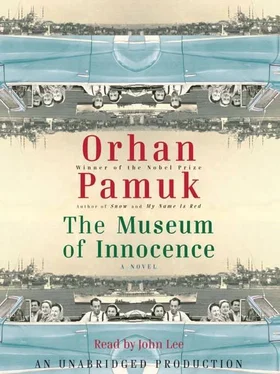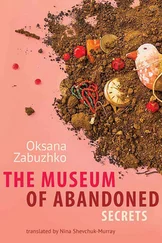If Zaim, Tayfun, Mehmet, and various other friends eyed me with similar expressions-half reproach and half sorrow-it was because the police report attributed the accident to driving under the influence of alcohol (the role of the dog having gone unnoticed) and because the press had embellished the story with a dose of scandal. The Satsat employees were as respectful as ever, and touchingly empathetic.
After six weeks they got me started on physical therapy. Learning to walk again felt like starting life over, and as I embarked on my new existence, I thought about Füsun constantly. But thinking about her now had no connection to the future, or to the desire I’d once felt; slowly Füsun became a dream of the past, the stuff of memories. This was unbearably painful, now that suffering for her no longer took the form of desiring her, but of pitying myself. I was at this point-hovering between fact and remembrance, between the pain of loss and its meaning-when the idea of a museum first occurred to me.
I sought consolation in Proust and Montaigne. I would sit across the table from my mother at supper, the yellow pitcher resting between us, and as we ate I would pay little mind to the television. My mother felt that Füsun’s death was something akin to my father’s, and that since we’d each lost our most beloved, we had unlimited license to sigh and brood to our hearts’ content and apportion blame together. Vaporous raki glasses had figured prominently in both deaths, and so, too, had the secret world that each of the departed harbored within, until the pressure grew so great that there was no choice but to tell the secret. My mother didn’t care for this second similarity, but I wanted to lay everything out for consideration.
During the first few months after my release from the hospital, whenever I went to the Merhamet Apartments to sit down on the bed and smoke a cigarette and view the surrounding objects, a feeling awoke in me that if I could tell my story I could ease my pain. But to do so I would have to bring my entire collection out into the open.
I longed to patch things up with Zaim and have him again as my confidant. But in January 1985 I heard from Hilmi the Bastard that he and Sibel were very happy together and expecting a child. Hilmi the Bastard also told me that Nurcihan and Sibel had fallen out over something trivial. There was no reconnecting with them. Nor could I go to the new clubs and restaurants frequented by the old clientele of the Pelür and Garaj; my story was important to me and I did not wish to see it reflected in other people’s eyes, or to be seen as a broken wretch. For this reason, during a first and last visit to Şamdan, I laughed and joked and teased Tayyar, the aging waiter, whom I knew from the Pelür, making sure everyone noticed my high spirits, thus leaving the gossips to conclude that “in the end” I had “saved” myself from “that girl.”
One day I ran into Mehmet on a corner in Nişantaşı, and we agreed to meet for a meal on the Bosphorus, “just us men.” The Bosphorus restaurants had ceased to be places people saved for special occasions; now one went any day of the week. Sensing my curiosity, Mehmet began by telling me what all my old friends were up to. He said that he and Nurcihan had gone to Uludağ with Tayfun and his wife, Figen; that Faruk (the same Faruk whom Füsun and I had run into at Sariyer Beach) had been effectively bankrupted by high inflation, on account of dollar loans, but had fended off ruin by taking out more bank loans; and that though there was no ill feeling between Mehmet and Zaim following Nurcihan and Sibel’s falling-out, he no longer saw Zaim. Before I could ask why, Mehmet explained that Sibel had been needling Nurcihan for becoming too “à la Turca,” going to gazinos to hear classical singers like Müzeyyen Senar and Zeki Müren, and fasting during Ramadan (“Is Nurcihan really fasting?” I asked with a smile). But I recognized at once that this was not the real reason for the rift between these two old friends. Mehmet, imagining I wished to return to my old world, wanted to pull me back to his side. But he’d misread my intentions. Six months after Füsun’s death, I knew categorically that I could never return to that world.
After drinking a little raki , Mehmet confessed that while he loved Nurcihan dearly and had the utmost respect for her (this second feeling having assumed recently elevated importance), he did not find her as attractive as he had before she’d given birth. After enjoying a long and romantic courtship, getting married, and starting a family, they had quickly reverted to their former selves, with Mehmet resuming old habits. Sometimes leaving the children with his mother, he and Nurcihan would go out together, but more typically he would go out to new clubs and bars alone, the sort of places favored by advertisers and the rich, to which in his determination to lift my spirits and regain my camaraderie he was now introducing me, as he would the city’s up-and-coming neighborhoods.
Another evening, Nurcihan came out with us. We went to a big new part of town just beyond Etiler that had sprung up in the space of a year, to eat a strange menu of dishes presented as American cuisine. Nurcihan did not mention Sibel, nor did she inquire about my feelings in the wake of Füsun’s death. One thing she said I took to heart, however; in the middle of the meal, apropos of nothing, she said she knew “deep in her bones” that I would one day be very happy. I had never more keenly felt that the chance for happiness in this life was forever lost to me. Perhaps this is why, although Mehmet seemed very much the old Mehmet, with Nurcihan I felt as if I were meeting a new person, as if all those memories in common no longer existed. It also occurred to me that the restaurant’s atmosphere, and these new city streets, which didn’t agree with me at all, may have also contributed to my feeling.
There were more of these new streets, these strange new concrete neighborhoods with each passing day, and they served only to reinforce my impression since getting out of the hospital that with Füsun’s death, Istanbul had become a very different city. Let me say now that this feeling was my most important preparation for the many years of wandering that lay ahead.
It was only when calling on Aunt Nesibe that I could feel the old Istanbul, the city I had so loved. One evening, after the first tearful visits, she, dispensing with formalities, told me I could go upstairs to look at Füsun’s room whenever I wished, and take away with me as much as I wanted.
Before going upstairs I performed what had been our ritual: I went over to Lemon’s cage to check his food and water. This, like any recollection of our suppers together, of our conversations while watching television, of everything else we had shared sitting at the table, was enough to bring tears to Aunt Nesibe’s eyes.
Tears… Silences… Because memories of Füsun were too painful for either of us to bear, I would be quick about the requisite preliminaries before going up to her room. Once a fortnight I would walk down to Çukurcuma from Beyoğlu, and as Aunt Nesibe ate supper we would watch television in silence, and after paying some attention to Lemon, who was slowly growing older and more quiescent, I would go look through Füsun’s bird pictures, one by one, after which review, announcing the need to wash my hands, I would head upstairs, my heart beating ever faster as I entered Füsun’s room and opened up her drawers and cupboards to go through her things.
All the presents I’d brought her over the years-the combs and brushes and little mirrors, and butterfly brooches and earrings-she had arranged in the drawers of the little cabinets. There were things I had forgotten ever having given her-socks for the tombala sack, the wooden buttons I had thought I was buying for her mother, hair clips, as well as the toy Mustang Turgay had given her, and the love letters I had sent via Ceyda-to find these artifacts weighed on me so that I could never linger more than half an hour among these drawers and cupboards that still bore her scent. Sometimes I would sit on the bed and relax with a cigarette, sometimes, to stem my tears, I would stand at the window, or on one of the balconies on which she had painted her birds, before picking up a sock or a comb or two to take away with me.
Читать дальше












